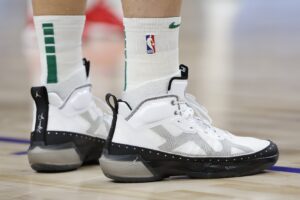A new NBA salary cap adjustment could mean that players are less likely to negotiate one-year deals for that season’s maximum, taking some of their leverage away and strengthening the position of teams in contract negotiations.
NBA Salary Cap Adjustment Could Reduce One-Year Contracts
Eric Pincus of Basketball Insiders reported that while the projected salary cap for the 2017-18 season is holding steady at $102 million, the projection for the following season has dropped five million dollars to $103 million.
The reason given for the lowered projection is increased player benefits as part of the new collective bargaining agreement between. A perhaps unintended consequence is that one-year deals like those that Cleveland Cavaliers forward LeBron James has could decrease in frequency.
How 1+1 Deals Work in the NBA
James is perhaps the most well-known of a small group of NBA players who have the star power to negotiate one-year contracts with a player option for a second year, more commonly referred to as 1+1 deals.
Players who sign these deals forfeit millions of dollars in guaranteed money that they could get in max contracts in exchange for the leverage that these 1+1 deals afford them. Joe Vardon estimated that James gave up $46 million when he signed his current 1+1 contract.
Those players can afford to give up the money of a max deal because they are making just as much if not more money from product endorsements, like James’ deal with Nike. The players always have the threat of opting out and signing elsewhere to force teams to try to keep them happy.
While the number of players who have the credentials necessary to demand these type of leverage deals is small, those players are also the most in demand. It makes building a sustainable product more difficult for teams, and that’s why a lower salary cap could be considered a good thing for individual franchises.
Why 1+1 Deals Could Decline
While the leverage is obviously more important to these players than the money, if the disparity between the money they can get in a 1+1 deal and that which they could get in a max contract grows too large, 1+1 deals won’t make sense for those players.
Teams could also grow increasingly hesitant to give them out, as it not only creates an air of uncertainty for the on-court product, but all phases of the team’s business. Making long-term plans for the team’s branding, marketing, and stadium features becomes more difficult when the team doesn’t know for sure if its superstar player is going to be around for more than a season.
These deals are already few and far between, reserved for only the very top echelon of players in the league. A drop in the salary cap could make them even more scarce. That would put teams in an increasingly powerful position in not only negotiating player contracts, but maintaining those relationships with players throughout the lives of their contracts.
Main Photo






